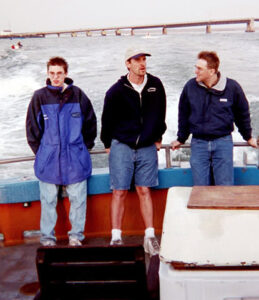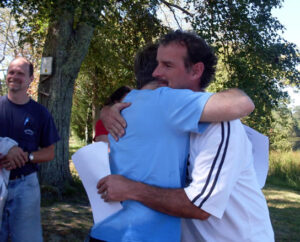“…we frequently say that we do not have enough time for something. In reality, these statements are rarely true. If we are honest, ‘not enough time’ can almost always be translated as, ‘I did not do that because it was not a high priority.’ Someone committed to an individualistic worldview will find time for different things than we would see on a New Ager’s schedule. Similarly, the highest ethical loyalties of a nationalist will vary significantly from those of a committed Christian.” Steve Wilkens, Hidden Worldviews: Eight Cultural Stories That Shape Our Lives
How to Fight Like a Christian

This time of year we gather around the Thanksgiving table with family. Fall colors, generous portions of pie, football games, and a golden brown turkey are all on the menu. The warmth of hearth and home fill our hearts during this special family holiday. If only the actual members of our families were as pleasant and cozy as this idyllic image. Brothers we exchanged harsh words with, uncles without manners, controlling mothers and alienated daughters sit around this family table. We love family, it’s people we have a hard time with. Why is this so painfully true? Because people are not idyllic, they’re real.
What makes relationships worth having is the fact that we can’t control them. We are thrilled when someone freely chooses to love us because we know they didn’t have to. But if they are free to choose us they are also free to reject us. Human will is so mysterious, so independent, and so free that it has the power to baffle and frighten. So, is the goal of a loving family culture possible? Yes it is, if we strive to become the kind of person who is capable of communion.
We can start by learning how to have conflict. Since people are real they will be different. That difference is what leads to conflict. It’s natural, it’s normal, and it’s not necessarily bad. When two people dance they have to adjust themselves to each other’s movements. If one partner imposes his will on the other, the dance becomes stiff, ugly, and toes are stepped on. When a couple dances gracefully, however, they may tread on each other’s toes, but they continually learn how to become more fluid in their movements, together striving to solve the missteps. They don’t fight each other.
When people have conflict they tend see themselves on opposite sides of a line of battle. They lob arguments, emotions, and strong words in hopes of winning. But we’re not at war with our family and friends. We’re on their side. Rather, like a dance, we should see ourselves in a circle, looking at the problem together, not like a war, seeing ourselves on either side of a battle line. The win is when both of us change and we learn to gracefully step in unison.
Conflict is normal because we’re different. Our love and friendship compel us to tackle this problem together as partners not enemies. When we do, the warmth and joy it brings is truly something for which to be thankful.
Surprised by Hope
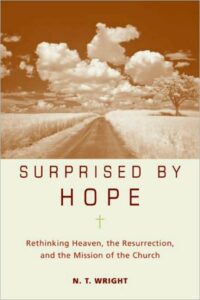
I just finished reading, Surprised by Hope: Rethinking Heaven, the Resurrection, and the Mission of the Church, by NT Wright. Wright is a New Testament theologian and currently serves as the Bishop of Durham in the Church of England.
What I appreciate about his writing is his ability to “get into the shoes” of first century Christians to gain fresh perspectives concerning the Christian faith. He apprehends complex theological issues, makes them understandable for the reader, then shows its relevance and application for Christians today. Often times this “new perspective” results in a paradigm shift that opens new opportunities and ways of thinking.
I used to think it really doesn’t matter what you believe concerning heaven. Whatever heaven may be like, I’m sure its good, but the important thing is how you live your life now so that you can “get to heaven.” After reading NT Wright’s book I understand more concretely how our view of heaven and the resurrection has direct consequences on how we live our lives and make choices today.
Reading this book revolutionized my view on two levels:
Firstly, the fact that Jesus has entered into our world, died, and was resurrected means that God’s new creation has already begun in this world. What we do on earth really matters for eternity, not to “get to heaven,” but to co-labor with God to bring about God’s new Kingdom. Whenever I promote forgiveness, pray for my enemies, or reach out to a stranger I participate in bringing God’s kingdom “on earth as it is in heaven.” The world isn’t going to be “burned up” but it is going to be completely and gloriously renewed and I am invited to participate in this renewal process.
“Jesus’s resurrection is the beginning of God’s new project not to snatch people away from earth to heaven but to colonize earth with the life of heaven. That, after all, is what the Lord’s prayer means.”
The second point is similar in the idea that ALL of Gods creation is good. There is no “bad” part of creation. Bad comes when I worship the created instead of the creator. The fact that I am created or human does not make me evil, bad or sinful. But when I decide to worship elements of this world instead of the creator, this is evil, bad and sinful; I only participate in my own dehumanization and contribute to the corruption of the world as it is. But when I honor God as creator, I affirm my own humanity and God’s good creation. I am free to be wonderfully and fully human and to enjoy God as he has created me. These thoughts have helped me to become less judgmental and more accepting of others.
“How will God’s new creation come? and then, How will we humans contribute to the renewal of creation and to the fresh projects that the creator God will launch in his new world? The choice before humans would then be framed differently: are you going to worship the creator God and discover thereby what it means to become fully and gloriously human, reflecting his powerful, healing, transformative love into the world? Or are you going to worship the world as it is, boosting your corruptible humanness by gaining power or pleasure from forces within the world but merely contributing thereby to your own dehumanization and the further corruption of the world itself?”
This book is rich with new perspectives concerning heaven, the resurrection, and the mission of the Church. It has given me fresh hope, understanding and excitement concerning how I live my life today as a Christian in the 21st century.
Think, Act, Befriend
“All meaningful knowledge is for the sake of action, and all meaningful action for the sake of friendship.” John Macmurray, The Self as Agent
Who Am I?
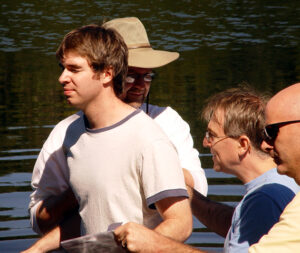
I’ve enjoyed reading Joel Green’s Body, Soul, and Human Life. While I can’t say I fully understand or agree with everything I’ve read, it has been very helpful in connecting the dots of several concepts, particularly, how we are to think about ourselves. Green makes the case that we shouldn’t see ourselves in a Cartesian way (i.e. René Descartes of “I think, therefore I am” fame), meaning that our true self is mind or spirit quite apart from our bodies. Rather, Green says that human identity is threefold: physicality, relationality, and narrativity. This has important implications for community, which I’d like to explore briefly.
Physicality
Our bodies are not something we have but part of who we are. The Scriptures talk about bodily resurrection, not a disembodied spiritual existence, so even in the after life, the body will matter. What does this mean for us? Among other things, it means that what I do with my body is important. It means my gender matters and is part of who I am. It means that this life and creation are good, to be cared for and treasured, and not to be seen as alien and sinful. It means that caring for people’s physical needs cannot be separated from caring for their “spiritual needs.” As Green says, “Angst among Christians in recent decades over how to prioritize ministries of ‘evangelism’ and ‘social witness’ is simply wrongheaded, therefore, since the gospel, the ‘evangel’ of ‘evangelism’ cannot but concern itself with human need in all its aspects.”
Relationality
Individualism is the plague of our time and is fully at play in the Church. Cartesian thinking makes us believe that our identity, our true self, is a personal possession of an inner reality. It’s me and Jesus and all I need is some good instruction to be a better me. The truth is that we are a inextricably part of a web of relationships. We are part of a community and our identity is tied into that network of people. Green points out that our brains are actually shaped by our relationships, so in a very tangible sense, our relationships shape who we are. There are no loners, and to try to be one is to fight against reality. This is why cherishing, developing, and enjoying our relationships must be our prime task in life. Quoting Green, “…we are shaped in our character and limited in our choices by the company we keep.”
Narrativity
The stories by which we make sense of our lives play a part in forming who we are. Our life is less like the running of a machine and more like the performance of a drama. Our history matters. Our direction matters. We need to know, like Jesus, where we come from and where we’re going (John 13:3-4). Our story and the overarching story we identify with sculpts us profoundly. Narrative disrupting experiences, like divorce, hurt us because whole chapters of our lives become off-limits. We can’t escape our history (so true especially today in a Facebook world). This is a further reason to continue in our relationships and work through difficulties. Additionally, we need to actively recall and rehearse the overarching narrative of God that we are a part of. Liturgy, regular scripture reading, and flowing in the rhythm of the Christian calendar are ways to do this.
This understanding of our nature impacts and supports the vision of Christian community. We are not marbles in a bucket, but cells in a body. Green would say, “…who we are, our personhood, is inextricably bound up in our physicality, and so is inextricably tied to the cosmos God has created, and in the sum of our life experiences and relationships.” Christian community fits well in this view of humanity.
Where are you being formed?
“For 1 Peter, then, human life is life on the potter’s wheel, so to speak – being shaped one way or the other, by the ancestral ways expressed in taken-for-granted social conventions, or by the sanctifying work of the Holy Spirit and the formative influence of the people of God. Humans act out of their formation, so the primary questions must be, Formed according to what pattern? Formed within what community?” Joel B. Green Body, Soul, and Human Life
God’s Good – Scarcely Imagined
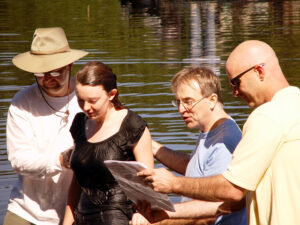
“Like those who live with life-long disease, humans easily adjust their lives to account for their maladies. The human family can scarcely imagine what the freedom to chose God’s ‘good’ would be, so much has humanity adapted itself to estrangement and alienation.” Joel B. Green, Body, Soul, and Human Life
Justification

I recently read N.T. Wright’s book, Justification: God’s Plan and Paul’s Vision. His driving force for this book is a response to a book published in 2007 by Dr. John Piper called, The Future of Justification: A Response to N. T. Wright, which probes the foundations of Wright’s understanding of Paul and if this is a helpful or harmful understanding.
I personally find Wright’s view of The New Perspective on Paul very exciting. I love how he puts the Scriptures, Paul, and Jesus in their historical context. He takes that same approach with this book and makes the doctrine of justification very clear and historical. I’m personally not helped by the esoteric explanations of justification that others have given. What I loved most about this book, though, is the overarching, big picture paradigm which is opposite of an anthropocentric vision that is often espoused.
Here are some great quotes of this idea of us not being the center of the universe:
“Salvation is hugely important…. Knowing God for oneself, as opposed to merely knowing or thinking about him, is at the heart of Christian living…. But we are not the center of the universe. God is not circling around us. We are circling around him. It may look, from our point of view, as though ‘me and my salvation’ are the be-all and end-all of Christianity. Sadly, many people–many devout Christians!–have preached that way and lived that way. This problem is not peculiar to the churches of the Reformation. It goes back to the high Middle Ages in the Western church, and infects and affects Catholic and Protestant, liberal and conservative, high and low church alike. But a full reading of Scripture itself tells a different story (23).”
“God made humans for a purpose: not simply for themselves, not simply so that they could be in relationship with him, but so that through them, as his image-bearers, he could bring his wise, glad, fruitful order to the world. And the closing verses of Scripture, in the book of Revelation, are not about human beings going off to heaven to be in a close and intimate relationship with God, but about heaven coming to earth (24).”
“Paul’s view of God’s purpose is that God, the creator, called Abraham so that through his family he, God, could rescue the world from its plight…. Paul’s understanding of God’s accomplishment in the Messiah is that this single purpose, this plan-through-Israel-for-the-world, this reason-God-called-Abraham … finally came to fruition with Jesus Christ (94).”
N.T. Wright in many of his books, and certainly in this one, has continually opened my eyes to the big picture of God’s purpose and saving activity in the world.
Embrace judgment
As Christians we are not delivered from God’s judgment. Because of the kindness and mercy of our God our judgment is transformed to discipline. Sin is unthinkably destructive. Because it causes suffering it can’t be ignored or flippantly passed over. It will not do to just receive a clean bill of health when the cancer still lives, eating away life moment by moment. The cancer has to go.
This is what Colin Gunton tells us in The Christian Faith:
“…on the cross Jesus bears God’s judgment on sin in order not that sinners should not be judged (condemned), but that they should endure judgment in a different form, as discipline. The point is indicated in Barth’s observation that Jesus’ bearing of God’s judgment for us does not mean that we are not judged ourselves…Christ, we might say, bears anticipatorily the eschatological judgment of death – he goes to hell – in order that those who trust in God through him should be able to bear the judgment that cleanses rather than annihilates.”
God works on us and disciplines us to form us into people who reflect His love. He forgives and heals us. This is, at times, a painful but happy process whereby we change to become people who can be good friends to others and faithful followers of our loving Master.
Audio – More Human
[audio:http://life-mission.org/media/akrell/morehuman.mp3]
Download Mp3
This is a recent message I gave on Christ becoming fully human so we could become more human.
